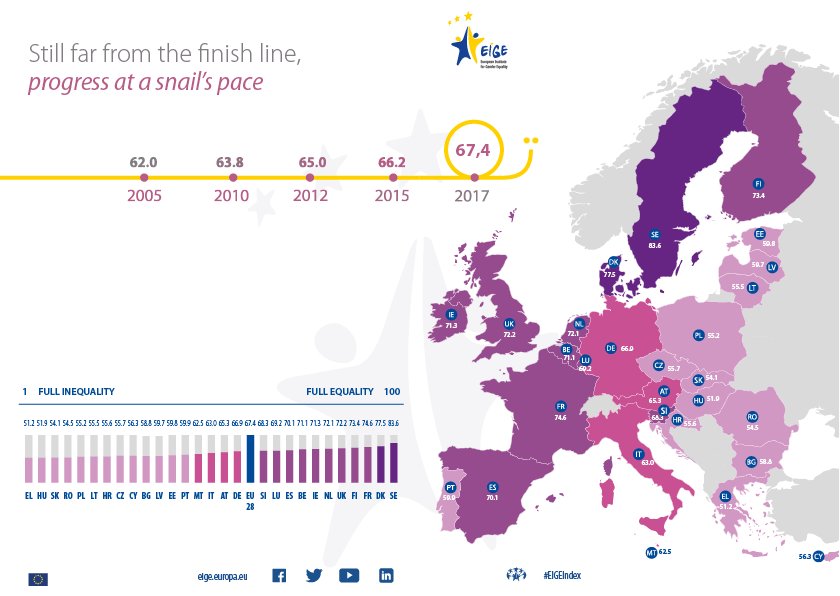Today the European Institute for Gender Equality (EIGE) launched their latest Gender Equality Index for 2019. Representatives of the Government of Kosovo, European Union (EU) Office in Kosovo and the Kosovo Women’s Network (KWN) attended, among others from throughout the EU, Western Balkans and beyond.
Overall, the newly published data suggest that the EU has progressed towards gender equality at a “snail’s pace”, with EU countries moving only 5.4 points closer to gender equality in the last 12 years.
“Europe is getting closer to gender equality,” Blandine Mollard, Research Officer at EIGE concluded in her presentation of the 2019 Gender Equality Index, “but not everywhere, not in every aspect, and clearly not fast enough.”
With absolute equality at 100, on average the EU scores 67.4. Sweden and Denmark remain leading countries in terms of gender equality. While some countries improved their scores, such as Portugal (+3.9), Estonia (+3.1) and Croatia (+2.5), other countries have regressed since 2015, including Poland (-1.6), Lithuania (-1) and the Netherlands (-0.8).
When looking at specific domains within the index, the greatest gender inequalities exist relating to power, knowledge and time. Slight improvements occurred related to money and work. Gender equality is greatest in relation to health, though inequalities still exist. EIGE identified gender segregation, gender norms around care and gender inequalities in pay as the main factors “stalling” gender equality.
Meanwhile, Virginija Langbakk, EIGE Director, observed that data remains lacking in many important areas, including related to violence, rape and femicide.
Gains in the power domain were strongly linked to legislative changes, namely quotas for women’s participation in politics.
“Where there are binding measures, we see progress”, observed Joanna Maycock, Secretary General of the European Women’s Lobby (EWL). Yet, there is no country in the EU that has achieved gender equality, she said. Beyond gender stereotypes, she attributed continued gender inequalities to austerity measures. She said that austerity measures are a “disaster for the EU on every level: socially, economically, and politically” and particularly for women’s rights. She emphasized the need to “invest in quality services from a gender equality lense”.
This is a responsibility of politicians and institutions to ensure state funds for childcare, early education, elderly care and other services that support the furthering of equality.
Other research by EIGE has found a shrinking space for civil society, which has had consequences for persons who have suffered domestic violence in particular.
EWL also has observed “closing democratic space for women’s organisations … from the Baltics to the Balkans”, Maycock said.
The need to invest in the women’s movement as a clear, key driver of change towards gender equality was observed by several speakers.
They also discussed the importance of reframing the dialogue and showing that supporting gender equality is not an “additional cost”, but rather an “investment” in a better society. There was a call to ensure that the new EU Multiannual Financial Framework for the next seven years be reviewed from a gender perspective and to ensure gender budgeting, a treaty obligation. Long-term measures towards gender equality require long-term financial investments to bring about changes towards gender equality.
In addition to the EU Gender Equality Index, EIGE presented their Work-Life Balance Scoreboard, which examined parental lave, long-term care, childcare, public infrastructure, flexible working arrangements and lifelong learning in the EU. Speakers discussed how infrastructure such as public transport availability and access to childcare services affect gender equality.
For example, only 11 EU countries have reached the Barcelona Objective targets for early childhood education and care availability. Research has shown that childcare facilities have the biggest effect on reducing gender inequalities.
While some WB countries have established the Gender Equality Index, Kosovo is still in the process of developing it. The index can provide key information that supports decision-making by government officials and legislators, towards creating better informed policies that contribute to the wellbeing of both women and men.







